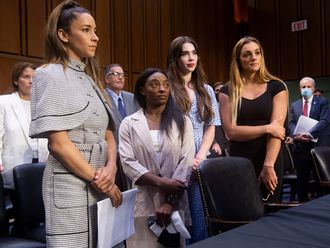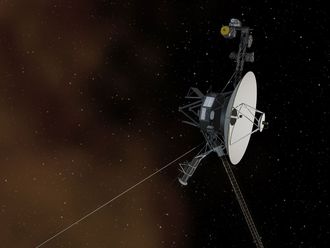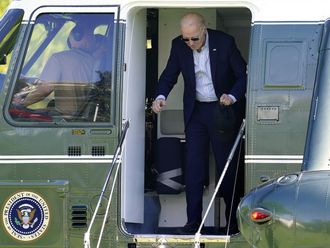Washington: Mitt Romney’s decision to forgo a third try at the White House has settled the question of whether the 2016 GOP presidential field has a front-runner — bestowing a coveted status on former Florida Gov. Jeb Bush that also raises new challenges and perils.
Republicans have a tradition of picking an anointed one early. That establishment candidate almost always ends up with the nomination, although not without a fight and some speed bumps along the way.
But this is a particularly unsettled time for the party. It is struggling to define its identity amid open warfare among its various factions. And there are a raft of fresh and potentially appealing faces emerging on the scene, comprising what many Republicans believe could be the strongest undercard of early-bout contenders in decades.
Losing Romney as a rival is “a mixed bag for Bush,” said veteran GOP strategist Saul Anuzis, a former chairman of the Michigan Republican party. “He also becomes the target of everyone who is anti-establishment. Before, you had Romney and Bush kind of splitting up that ire.”
Bush was already assembling a formidable army of fund-raisers and talented operatives, including poaching Romney’s top Iowa strategist, David Kochel, to be his national campaign manager.
That process appears to be intensifying after the 2012 GOP presidential nominee bowed out on Friday.
“It’s a great day for Jeb Bush,” said Brian Ballard, a lobbyist who led Romney’s 2012 fund-raising effort in Florida and switched to Bush this time around. “I think Jeb had 75 per cent of the money folks here. This brings in the other 25 per cent.”
Chicago private-equity executive Bill Kunkler and his wife, Susan Crown, had been top fund-raisers for Romney in the last election and had expected to be there again for him in 2016.
Now, Bush is “the only one my wife and I will work for,” Kunkler said. “If it’s not Jeb, we’re done for this cycle. I know in my heart that Jeb is the only one who passes the presidential test ... We’ll be all in for him.”
But there will be plenty of competition for the big funders who built the massive Bank of Mitt in 2012.
Virginia fund-raiser Bobbie Kilberg, who with her husband, Bill Kilberg, raised more than $4 million (Dh14.69 million) for Romney, said they had committed to help him again if he ran. Now, she will support New Jersey Gov. Chris Christie — and bring as many other donors over as she can.
Still, “we shouldn’t assume that the only people competing for the centre-right pie will be Jeb and Chris. I don’t think any of the prospective candidates will be shy about going after these donors. It’s a race between everyone,” said Kilberg, who cited former Texas Gov. Rick Perry, Sen. Rand Paul, R-Ky., and Wisconsin Gov. Scott Walker as also making strong appeals.
Marshaling resources, however, is not the only challenge for Bush that may have been heightened with Romney’s decision not to run.
“It raises expectations in kind of an unrealistic way,” said one member of the former Florida governor’s nascent campaign team, who did not want to be identified discussing his strategy.
Bush’s biggest challenge — and now, arguably, his most urgent — is to define himself for an electorate whose impression of him has been shaped largely by the last name that he shares with two former presidents, his father and his brother.
That is not an unalloyed asset at a moment when many Republicans are looking to turn the page politically and are intrigued by relative newcomers. Walker, who was a big hit at a conservative gathering in Iowa last weekend, led a tight field in a Des Moines Register/Bloomberg Politics poll of that state’s caucusgoers released Saturday night. Christie can boast of a landslide 2013 re-election in a heavily Democratic state. Another potential candidate is Bush’s fellow Floridian, the charismatic Sen. Marco Rubio.
The former governor also does not have a strong connection with elements of the grass-roots base of his party, as do such figures as tea party favourite Sen. Ted Cruz, R-Texas, libertarian Paul, or social-issue warriors such as former Arkansas Gov. Mike Huckabee and former Pennsylvania Sen. Rick Santorum.
Bush himself last ran for public office more than 12 years ago — in the middle of his brother’s first term, before the launch of the Iraq war and at a time when the first iPhone was nearly five years in the future. (He does fancy himself a technology buff; his official portrait as governor features him standing beside a bookshelf, on which a BlackBerry rests in its charger.)
As the front-runner, he and his record are guaranteed to come under more scrutiny.
Two questions about Bush will be answered only by running: Will he be able to build a state-of-the-art campaign operation for a digital age? And does he have the retail political skills to prevail in early states such as Iowa and New Hampshire, which are a repetitive grind of town hall meetings, living-room receptions and candidate forums?
Bush expects his rivals to paint him as a moderate, given his positions on issues that inflame the GOP base, including his support for a path to legalisation for the undocumented immigrants and for Common Core. Conservatives, libertarians and even some liberals have criticised the K-12 academic standards in math and reading as undermining local control of education.
Bush believes he can run as an unabashedly conservative, free-market Republican without backing away from stances that have rankled the right. What will truly differentiate him, they vow, is his determination to run on a positive message that resonates with a broad audience nationally.
Among the themes he will emphasise are middle-class wage stagnation, upward mobility for those trapped at the bottom and outreach to minority communities that could hold the key to GOP hopes of winning in 2016. He named his political action committee “Right to Rise,” a slogan borrowed from Rep. Paul Ryan, R-Wis., who was Romney’s 2012 running mate.
Bush will go to Michigan on Wednesday to road-test his pitch before the Detroit Economic Club, which is known as a venue where presidential candidates of both parties go to showcase their policy bona fides.
But Bush advisers say his appearance in a heavily Democratic, economically devastated city is also designed to send another message — that he believes he is the Republican best equipped to compete across the map.












